|
On February 25, authors Natalie Iglewicz and Joy Wolfe Ensor met with a group of eighth-graders and their parents from Ann Arbor Temple Beth Emeth’s religious school. They opened their presentation with stories and photos of their parents’ lives in Poland before World War II, and followed up with inviting students to compare and contrast their lives to those of young Jews who lived during that time. Shifting to the wartime era, Natalie read excerpts from her chapter that highlighted lessons she learned from her parents about acts of lovingkindness. Joy’s excerpts centered on how her mother and aunt's creative writing kept their humanity alive during unimaginable suffering, imparting lessons for future generations. The authors also shared treasured personal family artifacts from this time period - ceremonial Kiddush cups that Natalie’s father managed to carry with him throughout the war, and fragments of original papers on which Joy’s mother and aunt wrote poetry in the camps. The students approached these objects with a level of respect and tenderness that was deeply moving. The authors concluded by encouraging the students to use their shared stories to explore how they can show up for others and themselves when encountering challenges in their own lives. Below are the photos of the artifacts shared and a couple of responses that students expressed in thank you notes to the presenters.
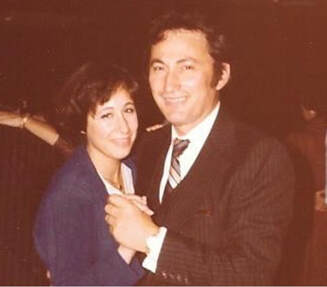 On February 7th at the Osher Lifelong Learning Institute of Eckerd College in St Petersburg, Florida, Ruth Finkel Wade discussed the gifts and challenges of growing up with Holocaust survivor parents. She read excerpts from The Ones Who Remember and engaged the participants in a rich conversation about living in the shadow of trauma. Ruth enjoyed sharing a 1978 photo of her with her survivor father in which you can see the twinkle in his eye that he still exudes today at age 92. All the participants expressed their appreciation in hearing about their evolving relationship and the experiences of the other authors described in the book. One person shared, “I never thought about what it was like after the war and how certain traits – good and bad are passed on.”  Baltimore high school student Isabel Reed was so moved after reading our book that she reached out to ask to interview some of our authors in the hope of publishing an article of interest for her city's local Jewish community paper. Just published this week, the result is a beautifully crafted and competently portrayed piece of journalism. You can read it right here. In earlier personal correspondence, Rita Benn asked Isabel what in the book specifically resonated for her and what she thought would be most important for young people her age to take away from our stories. She shared these three reflections as the most compelling: that love between parents and children prevails in spite of difficult family relationships and histories of trauma, that forgiveness is possible, and, that events and family issues may appear to be 'black and white' but in reality are much more 'grey' and complex. We are beyond thrilled that our book held so much meaning for Isabel, and grateful for her insight into themes we might emphasize when meeting with high school age students. One of our authors, Cilla Tomas, presented about our book to two different groups when she was travelling in Switzerland. She reflects on this experience and the reception she received in an article published in the January issue of the Washtenaw Jewish News. You can read it about it here.
Please join us for a unique learning adventure where we will take a deep dive in exploring our book over a 6-week period in a virtual book club format sponsored by Nautilus, a prestigious organization that awarded our book with a Silver Award. Our book club will feature a different topic each week with a variety of our authors. Participants will have opportunity to engage in live discussion with our authors and have access to a curated number of resources to supplement weekly presenting themes, and more generally, the second-generation history. In addition, sessions will include guided practices to encourage self-reflection, and experience compassion, gratitude, and tolerance We are limiting this series to only 20 participants so best to register early at this url. We so look forward to being with you through this venue.
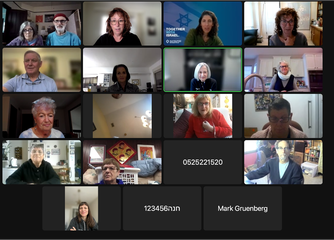 SlidingDors, a small program of the Jewish agency, Partnership2gether, offers participating members the opportunity to traverse the division of boundaries of country and periodically come together in one intimate community to share their stories of growing up in the shadow of the Holocaust. We were honored to be invited as a guest panel for this program. To best meet our audience, we decided to choose authors for our speaking panel who would represent the lived experience of diverse countries. On December 10 through Zoom, authors Avishay Hayut originally from Israel, Eszter Gombosi from Hungary, Rita Benn from Canada and Ruth Wade from the USA presented snapshots of our writing experience and life stories to individuals residing in Hungary, Israel, and US communities, such as Ohio, Texas and Omaha, to name a few. Each time we present we continue to be touched by how meaningful our audiences find our stories. We find that through our presentations and discussions, we are helping to draw out stories from our listeners, to validate aspects of their own histories and to reflect anew on their life narratives. We are also benefitting so much by furthering our understanding of the impact of the Holocaust, and forging new connections across the globe. What an unexpected gift and incredible journey we are on! The 2G Tuesdays Zoom program on November 14th, with Ruth Finkel Wade, Rita Benn and Ava Adler, was truly multi-generational. The audience was so engaged that the one-hour program went close to 2 hours before closing. This presentation was made possible by a third-generation descendant of Holocaust survivors, Michael Mantell. Inspired by the grandfather he never met, Michael, a psychotherapist and educator, has taken it upon himself to gather and feature the testimonies of both survivors and their children each month. Earlier in the fall, Ruth’s father Sidney “Sevek” Finkel, author of Sevek and the Holocaust; the Boy Who Refused to Die, shared his story of resilience together with Ruth. This month, Ruth along with her fellow authors, focused on their story growing up in the shadow of Holocaust trauma. We are encouraged that the work of ‘Never Forget’ and the lessons of inhumanity vs tolerance are being carried forth in the hearts of the third generation.
With the support of the Kurt & Tessye Simon Fund for Holocaust Remembrance of South Bend’s Temple Beth-El and the Jewish Federation, we keynoted their annual community-wide commemoration of Kristallnacht (the Night of Broken Glass) on November 12. Ava Adler, Joy Wolfe Ensor, and Avishay Hayut spoke about how our book’s messages are especially relevant in the present day, as we reel from the October 7 Hamas terrorist attack on Israel, the war that followed, and the antisemitic hate that has exploded in the U.S. and abroad. The authors chose excerpts from their chapters that aimed to address the questions that so many have in this moment: What helps us break the silence and speak out when we witness horrors? What keeps us grounded and centered when so much is out of our control? How do we hold our minds and hearts open to the suffering of others, even as we are being attacked? The Q&A invited us to reflect further on our own stories and the differences we see between the survivors and the generations that followed in making sense of the Holocaust and its impact. Most important, we discussed what we can all do now to make a difference.
On November 8, the Ethnic & Gender Studies Institute of Siena Heights University (a Catholic University founded Dominican nuns) invited us to present stories from our book to their students and faculty. This program was co-sponsored by the Office of Diversity and Inclusion and as well, the Department of English. Simone Yehuda, now a Professor Emerita, had taught at the university for over 40 years, so this was a homecoming of sorts for her. Along with Simone, authors and co-editors Rita Benn and Julie Ellis read excerpts of their book chapters to an audience of close to 50, all of whom were deeply engaged. We were each very impressed by the many thoughtful questions posed, particularly those by the students. For instance, they wondered how our Holocaust family history affected our response to the war between Israel and Gaza, and how they as non-Jewish persons can get involved in combatting antisemitism and spreading knowledge of survivor and 2G stories. We feel very grateful for the warm welcome of the Siena Heights community and for this opportunity to share and educate the attendees.
On her way to see her father in Tucson, Arizona, Ruth Finkel Wade made a stop in Scottsdale. She met with the Descendant’s Forum of the Phoenix Holocaust Association to talk with 2Gs about our book. The conversation and connections were lively. In talking about growing up in Chicago, one of the participants, Nanci Heiman, realized that she knew Ruth’s brother and Ruth as well. They both went to Temple Emanuel and OSRUI summer camp. Ruth read excerpts from her chapter as well as Myra Fox’s poem “Is It Essential?” This was followed by resounding agreement in the audience that “yes, it is essential.” Unfortunately, even more so now with the uptick in antisemitism we are seeing in the world today.
|
Archives
July 2024
Categories |
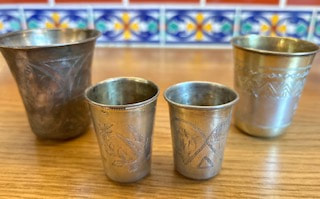
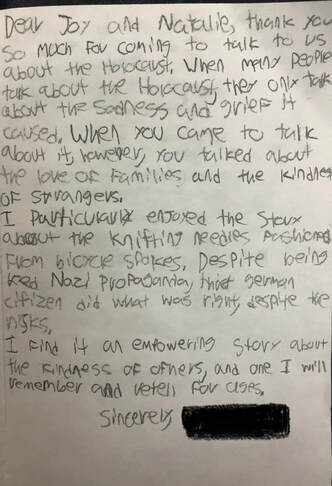
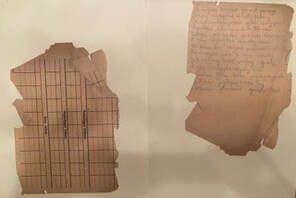
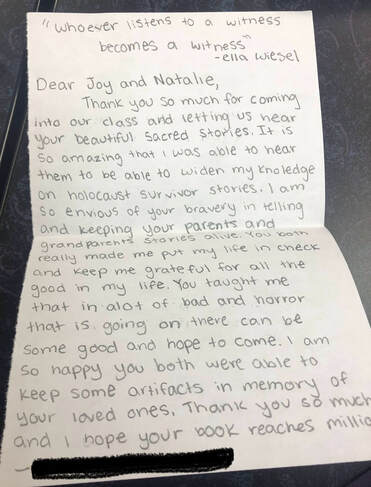
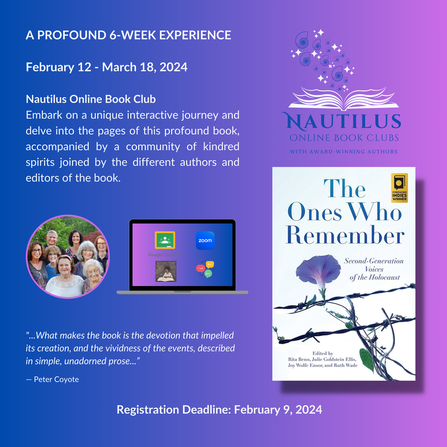
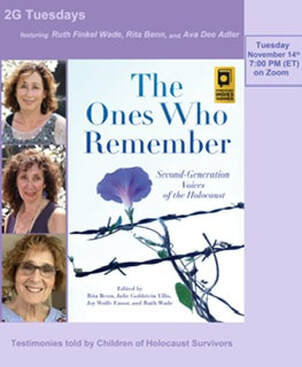
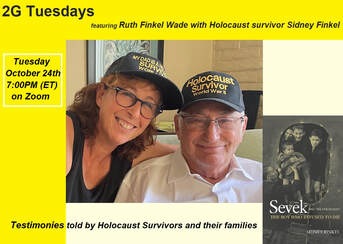
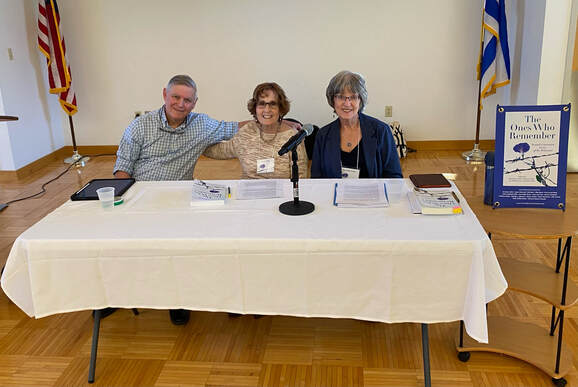
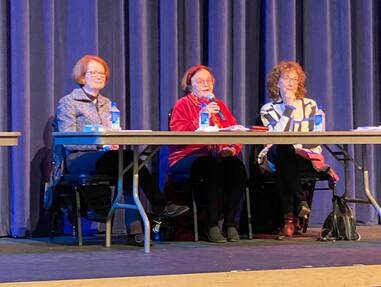
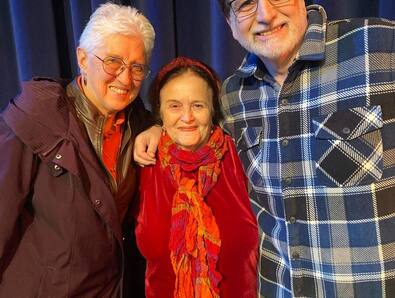
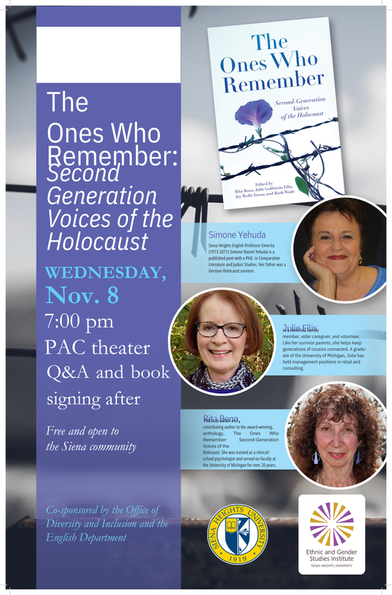
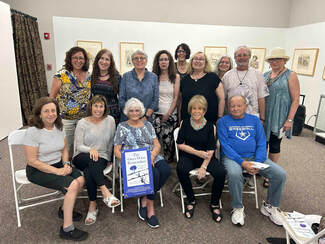
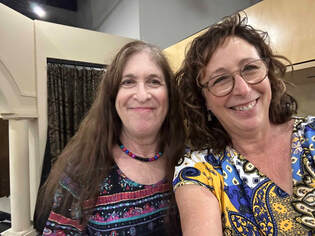
 RSS Feed
RSS Feed